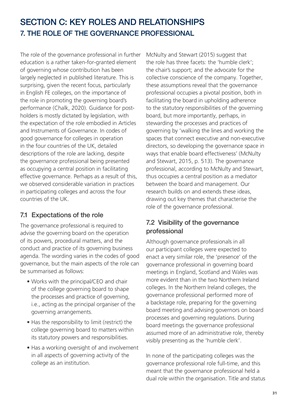
31
The role of the governance professional in further
education is a rather taken-for-granted element
of governing whose contribution has been
largely neglected in published literature. This is
surprising, given the recent focus, particularly
in English FE colleges, on the importance of
the role in promoting the governing board's
performance (Chalk, 2020). Guidance for postholders is mostly dictated by legislation, with
the expectation of the role embodied in Articles
and Instruments of Governance. In codes of
good governance for colleges in operation
in the four countries of the UK, detailed
descriptions of the role are lacking, despite
the governance professional being presented
as occupying a central position in facilitating
effective governance. Perhaps as a result of this,
we observed considerable variation in practices
in participating colleges and across the four
countries of the UK.
7.1��Expectations�of�the�role
The governance professional is required to
advise the governing board on the operation
of its powers, procedural matters, and the
conduct and practice of its governing business
agenda. The wording varies in the codes of good
governance, but the main aspects of the role can
be summarised as follows:
• Works with the principal/CEO and chair
of the college governing board to shape
the processes and practice of governing,
i.e., acting as the principal organiser of the
governing arrangements.
• Has the responsibility to limit (restrict) the
college governing board to matters within
its statutory powers and responsibilities.
• Has a working oversight of and involvement
in all aspects of governing activity of the
college as an institution.
McNulty and Stewart (2015) suggest that
the role has three facets: the 'humble clerk';
the chair's support; and the advocate for the
collective conscience of the company. Together,
these assumptions reveal that the governance
professional occupies a pivotal position, both in
facilitating the board in upholding adherence
to the statutory responsibilities of the governing
board, but more importantly, perhaps, in
stewarding the processes and practices of
governing by 'walking the lines and working the
spaces that connect executive and non-executive
directors, so developing the governance space in
ways that enable board effectiveness' (McNulty
and Stewart, 2015, p. 513). The governance
professional, according to McNulty and Stewart,
thus occupies a central position as a mediator
between the board and management. Our
research builds on and extends these ideas,
drawing out key themes that characterise the
role of the governance professional.
7.2��Visibility�of�the�governance�
professional
Although governance professionals in all
our participant colleges were expected to
enact a very similar role, the 'presence' of the
governance professional in governing board
meetings in England, Scotland and Wales was
more evident than in the two Northern Ireland
colleges. In the Northern Ireland colleges, the
governance professional performed more of
a backstage role, preparing for the governing
board meeting and advising governors on board
processes and governing regulations. During
board meetings the governance professional
assumed more of an administrative role, thereby
visibly presenting as the 'humble clerk'.
In none of the participating colleges was the
governance professional role full-time, and this
meant that the governance professional held a
dual role within the organisation. Title and status
SECTION C: KEY ROLES AND RELATIONSHIPS
7.�THE�ROLE�OF�THE�GOVERNANCE�PROFESSIONAL